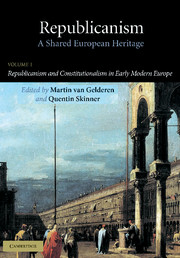Book contents
- Frontmatter
- Contents of Volume I
- Contents of Volume II
- Acknowledgments
- Introduction
- Part I The Rejection of Monarchy
- Part II The Republican Citizen
- Part III The Republican Constitution
- 9 From the Crisis of Civil Culture to the Neapolitan Republic of 1647: Republicanism in Italy between the Sixteenth and Seventeenth Centuries
- 10 Aristotelians, Monarchomachs and Republicans: Sovereignty and respublica mixta in Dutch and German Political Thought, 1580–1650
- 11 Debating the respublica mixta: German and Dutch Political Discourses around 1700
- 12 Classical Foundational Myths of European Republicanism: The Jewish Commonwealth
- 13 Republican Politics in Early Modern Spain: The Castilian and Catalano-Aragonese Traditions
- 14 The Idea of a Republican Constitution in Old Régime France
- 15 Republicanism, Regicide and Republic: The English Experience
- Bibliography
- Contributors
- Index of Names of Persons
- Index of Subjects
15 - Republicanism, Regicide and Republic: The English Experience
Published online by Cambridge University Press: 15 December 2009
- Frontmatter
- Contents of Volume I
- Contents of Volume II
- Acknowledgments
- Introduction
- Part I The Rejection of Monarchy
- Part II The Republican Citizen
- Part III The Republican Constitution
- 9 From the Crisis of Civil Culture to the Neapolitan Republic of 1647: Republicanism in Italy between the Sixteenth and Seventeenth Centuries
- 10 Aristotelians, Monarchomachs and Republicans: Sovereignty and respublica mixta in Dutch and German Political Thought, 1580–1650
- 11 Debating the respublica mixta: German and Dutch Political Discourses around 1700
- 12 Classical Foundational Myths of European Republicanism: The Jewish Commonwealth
- 13 Republican Politics in Early Modern Spain: The Castilian and Catalano-Aragonese Traditions
- 14 The Idea of a Republican Constitution in Old Régime France
- 15 Republicanism, Regicide and Republic: The English Experience
- Bibliography
- Contributors
- Index of Names of Persons
- Index of Subjects
Summary
Never has republicanism attracted so much interest among students of seventeenth-century England as in recent years, and never has so much confusion surrounded the word. Terms of ideological description are useful only if there is a common perception of their meaning or meanings. Here I shall examine the principal applications of the word ‘republicanism’ (or ‘republican’) to the period before and of the English civil wars, and test them against the ideas they are intended to describe. Secondly I shall ask how far those usages help us to understand the revolution of 1649 which brought the execution of king Charles Iy and the abolition of monarchy.
No single definition of republicanism can claim historical authenticity for itself. No one in or before the Puritan Revolution called himself or herself a republican. ‘Republican’ and ‘republicanism’ were terms of abuse and caricature. That does not necessarily make them useless to us. ‘Puritanism’ was a smear too, rejected by those to whom it was applied. Yet its usages corresponded, however indiscriminately, to a movement of belief at the centre of the civil wars for which we need a word and for which Puritanism, provided we know what we mean by it, is a good and perhaps the only one. Only the very loosest definitions of republicanism would award it a comparable centrality. Yet that word too, provided we know what we mean by it, has its purpose and perhaps even its necessity.
- Type
- Chapter
- Information
- RepublicanismA Shared European Heritage, pp. 307 - 328Publisher: Cambridge University PressPrint publication year: 2002
- 6
- Cited by



